Table of Content
Biography
![poet-gulzar_18f2c754-7258-11e9-817d-3278e204c144.avif]() Gulzar, born on August 18, 1934 as Sampooran Singh Kalra, is a well-known Indian Urdu poet, lyricist, author, screenwriter, and film director. He is renowned for his contributions to Hindi film and is regarded as one of the greatest Urdu poets of his generation.
Gulzar, born on August 18, 1934 as Sampooran Singh Kalra, is a well-known Indian Urdu poet, lyricist, author, screenwriter, and film director. He is renowned for his contributions to Hindi film and is regarded as one of the greatest Urdu poets of his generation.
Gulzar's career in film began as a lyricist in 1963 with the film Bandini. S.D. Burman, R.D. Burman, Salil Chowdhury, Vishal Bhardwaj, and A.R. Rahman was among the many music directors with whom he worked. Gulzar wrote poetry, dialogues, and scripts for several films in addition to music. In the 1970s, he directed Aandhi and Mausam, and in the 1980s, he directed the TV series Mirza Ghalib.
Gulzar has received various prizes over his career, including 5 Indian National Film prizes, 22 Filmfare Awards, an Academy Award, and a Grammy Award. In 2002, he received the Sahitya Akademi Award in Hindi, in 2004, the Padma Bhushan, and in 2013, the Dadasaheb Phalke Award.
Gulzar's family endured the problems of partition when he was born in Dina, Jhelum District, British India (now Pakistan), prompting him to abandon his studies and relocate to Mumbai to help his family. He worked at various little jobs around town before adopting the pen name Gulzar.
With the 1969 film Khamoshi, Gulzar's lyrics became well-known. Throughout his career, he collaborated closely with music director Rahul Dev Burman and other prominent composers. His work with A.R. Rahman on songs like Chaiyya Chaiyya from Dil Se and Jai Ho from Slumdog Millionaire gained him international acclaim and multiple honours, including an Academy Award and a Grammy.
Gulzar's films as a director frequently highlighted human connections intertwined with social themes. Mere Apne, Parichay, Koshish, Achanak, and Angoor are among his significant directorial works. He frequently used flashbacks in his writing, and he frequently cooperated with performers like Sanjeev Kumar, Jeetendra, Vinod Khanna, and Hema Malini.
Gulzar also directed the television series Mirza Ghalib, starring Naseeruddin Shah, and Tahreer Munshi Premchand Ki, based on Premchand's novels. He mostly writes in Urdu and Punjabi as a poet, and his work has appeared in three collections: Chand Pukhraaj Ka, Raat Pashminey Ki, and Pandrah Paanch Pachattar.
Gulzar's contributions to Indian cinema and literature have made him one of the industry's most recognised and celebrated individuals.
Age
Gulzar was born on August 18, 1934, which makes him 88 years old as of 2023. His zodiac sign is Leo.
Childhood
Gulzar was born Sampooran Singh Kalra on August 18, 1934, in Dina, Jhelum District, British India (now Pakistan). His father, Makhan Singh Kalra, was a trader, and he was born into a Sikh family. During his early years, Gulzar's love for reading and poetry blossomed, and he was strongly affected by the writings of renowned poets such as Mirza Ghalib and Allama Iqbal.
When Gulzar was just 13 years old, India was partitioned, forcing his family to leave their home and go to Mumbai, India. This turbulent period in his youth had a tremendous impact on him, and themes of partition and longing for one's homeland were reoccurring themes in his subsequent works.
Gulzar had to stop his academic education when he arrived in Mumbai in order to support his family. Despite the obstacles, his love of literature and poetry remained undaunted, and he began to immerse himself in a variety of languages, including Urdu, Punjabi, Braj Bhasha, Khariboli, Haryanvi, and Marwari. This self-education established the groundwork for his brilliant career as a poet, lyricist, and film director, propelling him to the top of Indian cinema and literature.
Family
Sampooran Singh Kalra, better known as Gulzar, was born on August 18, 1934, in the village of Dina in undivided India's Jhelum district. He is a well-known Indian Urdu poet, lyricist, author, screenwriter, and film director who has worked extensively in Hindi cinema. Makhan Singh, Gulzar's father, managed a little company, and his mother died while he was an infant.
Gulzar's family was forced to divide and go to Delhi as a result of India's partition in 1947. Before the partition, Gulzar attended a local school in his hamlet in Pakistan. Before becoming a writer, he worked in a variety of odd jobs in Bombay, including working at a motor garage where he produced paint colours to repair damaged cars.
Raakhee Gulzar’s Wife
![images (7).jpg]() Gulzar and Raakhee's love story began in the early 1970s, when they met. Raakhee's magnetism grabbed Gulzar, and she reciprocated his feelings. The couple decided to take their romance to the next level and married in front of the entire film industry in 1973.Their marriage was attended by prominent figures like Dilip Kumar, Rajesh Khanna, Jeetendra, and Amitabh Bachchan.
Gulzar and Raakhee's love story began in the early 1970s, when they met. Raakhee's magnetism grabbed Gulzar, and she reciprocated his feelings. The couple decided to take their romance to the next level and married in front of the entire film industry in 1973.Their marriage was attended by prominent figures like Dilip Kumar, Rajesh Khanna, Jeetendra, and Amitabh Bachchan.
However, their fairy tale love story encountered difficulties, and they eventually Separated in 1984. Despite their split, Gulzar and Raakhee never divorced and have a friendly connection. They raised their daughter, Meghna Gulzar, who is now a prominent filmmaker, together. Gulzar has stated that even after many years of living apart, he and Raakhee could never fully separate, and he continues to gift her the best sarees.
Gulzar’s Daughter Meghna
![Gulzars-biography-by-his-daughter-Because-He-Is....jpg]() Meghna Gulzar and Gulzar share a deep bond as father and daughter, which is evident in their personal and professional lives. Meghna, an accomplished writer, director, and producer, has drawn inspiration from her father's work and experiences on numerous occasions.
Meghna Gulzar and Gulzar share a deep bond as father and daughter, which is evident in their personal and professional lives. Meghna, an accomplished writer, director, and producer, has drawn inspiration from her father's work and experiences on numerous occasions.
Their love is vividly depicted in Meghna's book, Because He Is..., which provides insight into their lives and the profound bond they have.
Gulzar has always been encouraging Meghna to follow her dream of being a filmmaker. Meghna made her screenwriting debut with her father's 1999 film Hu Tu Tu, and then directed her first feature, Filhaal... in 2002. She has directed several hit films since then, including Raazi in 2018.
Career
Lyricist
![download (6).jpg]() Shailendra and Bimal Roy encouraged Gulzar to join films through his encounters at PWA Sunday gatherings. Gulzar began his career working with filmmakers Bimal Roy and Hrishikesh Mukherjee. In his novel Ravi Paar, he tells the story of Bimal Roy and the agony of creation. He began his career as a songwriter with the music director for the 1963 film Bandini. He discovered an environment related with literature in the group he worked with in films, notably Bimal Roy, whose films were mostly based on literary texts. Shailendra, who wrote the rest of the songs in the film, asked Gulzar to write the song Mora Gora Ang Layle, which was sung by Lata Mangeshkar.
Shailendra and Bimal Roy encouraged Gulzar to join films through his encounters at PWA Sunday gatherings. Gulzar began his career working with filmmakers Bimal Roy and Hrishikesh Mukherjee. In his novel Ravi Paar, he tells the story of Bimal Roy and the agony of creation. He began his career as a songwriter with the music director for the 1963 film Bandini. He discovered an environment related with literature in the group he worked with in films, notably Bimal Roy, whose films were mostly based on literary texts. Shailendra, who wrote the rest of the songs in the film, asked Gulzar to write the song Mora Gora Ang Layle, which was sung by Lata Mangeshkar.
Gulzar wrote the lines and lyrics for the 1968 film Aashirwad, which was directed and produced by Hrishikesh Mukherjee. Gulzar's song lyrics and poems added a poetic element and a much-needed additional dimension to Ashok Kumar's part in the film. For this portrayal, Ashok Kumar won Best Actor at both the Filmfare and National Film Awards. Gulzar's lyrics, on the other hand, were not well known until 1969's Khamoshi, when his song Humne Dekhi Hai Un Aankhon Ki Mehekti Khushboo '' became popular. In his book Bollywood Melodies, Ganesh Anantharaman calls Gulzar's lyrics as daringly defiant because of the intended blending of senses. He wrote two songs for the 1971 film Guddi, one of which is a prayer known as Humko Man Ki Shakti Dena.
Gulzar worked closely with music director Rahul Dev Burman as a lyricist. In addition to Sachin Dev Burman, he has collaborated with Shankar Jaikishan, Hemant Kumar, Laxmikant-Pyarelal, Madan Mohan, Rajesh Roshan, and Anu Malik. Gulzar worked with Salil Chowdhury in Anand (1971) and Mere Apne (1971); Madan Mohan in Mausam (1975), and more recently with Vishal Bhardwaj in Maachis (1996), Omkara (2006) and Kaminey (2009); A. R. Rahman in Dil Se.. (1998), Guru (2007), Slumdog Millionaire (2008) and Raavan (2010) and Shankar-Ehsaan-Loy in Bunty Aur Babli (2005). Gulzar was inspired by Amir Khusrow's Ay Sarbathe Aashiqui when writing Ay Hairathe Aashiqui for Mani Ratnam's 2007 Hindi film Guru, which included music by A. R. Rahman.
Direction
![rd-burman-birth-anniversary-gulzar-pancham-combination-759.jpg]() Gulzar directed his first film, Mere Apne (1971), after writing dialogues and screenplays for films like as Aashirwad, Anand, and Khamoshi. The movie was a remake of Tapan Sinha's 1969 Bengali film Apanjan. Meena Kumari portrayed Anandi Devi, an elderly widow caught up in the local clashes between unemployed and troubled youth. The death of Anandi Devi in one of the conflicts helps them see the futility of violence. At the box office, the picture received a Above Average rating. He then gave orders to Parichay and Koshish. Parichay was influenced by the Hollywood film The Sound of Music and was based on Raj Kumar Maitra's Bengali novel Rangeen Uttarain.
Gulzar directed his first film, Mere Apne (1971), after writing dialogues and screenplays for films like as Aashirwad, Anand, and Khamoshi. The movie was a remake of Tapan Sinha's 1969 Bengali film Apanjan. Meena Kumari portrayed Anandi Devi, an elderly widow caught up in the local clashes between unemployed and troubled youth. The death of Anandi Devi in one of the conflicts helps them see the futility of violence. At the box office, the picture received a Above Average rating. He then gave orders to Parichay and Koshish. Parichay was influenced by the Hollywood film The Sound of Music and was based on Raj Kumar Maitra's Bengali novel Rangeen Uttarain.
He penned Koshish, a narrative about a deaf-dumb couple, for which Sanjeev Kumar won the National Film Award for Best Actor. In 1973, he directed Achanak, which was inspired by the 1958 murder case in Maharashtra's KM Nanavati , and story writer Khwaja Ahmad
Abbas received a Filmfare nomination for Best Story. Later, he directed Aandhi, which was based on the Hindi novel Kaali Aandhi by Kamleshwar. In addition to other accolades and nominations, the film received the Filmfare Critics Award for Best Movie. Although it was widely assumed that the film was based on the life of former Indian Prime Minister Indira Gandhi, it was really based on the life of Tarkeshwari Sinha. The film was banned from theatres during the 1975 emergency.
Gulzar expertly employs flashback in the telling of his stories. He also collaborates with other performers and staff members. The Gulzar-Sanjeev Kumar collaboration produced a number of great films (Koshish, Aandhi, Mausam, Angoor, Namkeen) that reflect Sanjeev Kumar's best performance as an actor. Actors such as Jeetendra, Vinod Khanna, and Hema Malini collaborated with Gulzar to establish their artistic credibility and gave some of their greatest and most introspective work in films. R D Burman composed music for nearly all of the films he directed in the 1970s and 1980s. Kishore Kumar, Lata Mangeshkar, and Asha Bhosle sang many of their hit songs. These include Musafir Hoon Yaron, Tere Bina Zindagi Se Koi (Aandhi), and Mera Kuch Samaan (Ijaazat).
Poetry
Gulzar mostly writes in Urdu and Punjabi, although he also writes in Braj Bhasha, Khariboli, Haryanvi, and Marwari. His poetry is written in Triveni stanzas. His poems have been collected in three anthologies: Chand Pukhraaj Ka, Raat Pashminey Ki, and Pandrah Paanch Pachattar. His short stories have appeared in Raavi-paar (also known in Pakistan as Dustkhat) and Dhuan (smoke).
Gulzar penned the hymn Nazar Main Rehte Ho for the Aman ki Asha peace campaign, which was co-founded by India's and Pakistan's premier media organisations. It was recorded by Shankar Mahadevan and Rahat Fateh Ali Khan. Gulzar composed ghazals for Jagjit Singh's CDs Marasim (1999) and Koi Baat Chale (2006).
List of the Movies Gulzar worked as Lyricist
|
Year
|
Film
|
|
2023
|
Kuttey
|
|
2023
|
Ponniyin Selvan:II (Dubbed)
|
|
2022
|
Darlings
|
|
2022
|
Sherdil: The Pilibhit Saga
|
|
2022
|
Ponniyin Selvan:I (Dubbed)
|
|
2021
|
1232 KMS
|
|
2018
|
Mohalla Assi
|
|
2018
|
Pataakha
|
|
2018
|
Soorma
|
|
2018
|
Bioscopewala
|
|
2018
|
Raazi
|
|
2018
|
The Sky Is Pink
|
|
2018
|
Mere Pyaare Prime Minister
|
|
2017
|
Rangoon
|
|
2017
|
Ok Jaanu
|
|
2016
|
Mirzya
|
|
2016
|
Motu Patlu: King of Kings
|
|
2015
|
Talvar
|
|
2015
|
Drishyam
|
|
2014
|
Lingaa (dubbed)
|
|
2014
|
Kill Dil
|
|
2014
|
Haider
|
|
2014
|
Dedh Ishqiya
|
|
2014
|
Kya Dilli Kya Lahore
|
|
2013
|
Shoebite
|
|
2013
|
Ek Thi Daayan
|
|
2013
|
Matru Ki Bijlee Ka Mandola
|
|
2012
|
Do Paise Ki Dhoop, Chaar Aane Ki Baarish
|
|
2012
|
Jab Tak Hai Jaan
|
|
2011
|
Chala Mussaddi... Office Office
|
|
2011
|
Teen Thay Bhai
|
|
2011
|
Kashmakash (dubbed)
|
|
2011
|
7 Khoon Maaf
|
|
2010
|
Raavan
|
|
2010
|
Striker
|
|
2010
|
Ishqiya
|
|
2010
|
Veer
|
|
2010
|
Raajneeti
|
|
2010
|
Dus Tola
|
|
2009
|
Kaminey
|
|
2009
|
Firaaq
|
|
2009
|
Billu
|
|
2008
|
Slumdog Millionaire
|
|
2008
|
Yuvvraaj
|
|
2007
|
Dum Kaata
|
|
2007
|
No Smoking
|
|
2007
|
Shafaq
|
|
2007
|
Just Married
|
|
2007
|
Jhoom Barabar Jhoom
|
|
2007
|
Guru
|
|
2007
|
The Blue Umbrella
|
|
2007
|
Dus Kahaniyaan
|
|
2006
|
Jaan-E-Mann
|
|
2006
|
Sabab
|
|
2006
|
Omkara
|
|
2005
|
Yahaan
|
|
2005
|
Paheli
|
|
2005
|
Bunty Aur Babli
|
|
2004
|
Raincoat
|
|
2004
|
Chupke Se
|
|
2004
|
Maqbool
|
|
2003
|
Pinjar
|
|
2002
|
Saathiya
|
|
2002
|
Makdee
|
|
2002
|
Dil Vil Pyar Vyar
|
|
2002
|
Lal Salam
|
|
2002
|
Leela
|
|
2002
|
Filhaal...
|
|
2001
|
Asoka
|
|
2001
|
Aks
|
|
2000
|
Fiza
|
|
2000
|
Zindagi Zindabad
|
|
1999
|
Khoobsurat
|
|
1999
|
Hu Tu Tu
|
|
1999
|
Jahan Tum Le Chalo
|
|
1999
|
Rockford
|
|
1998
|
Dil Se..
|
|
1998
|
Satya
|
|
1998
|
Swami Vivekananda
|
|
1997
|
Chachi 420
|
|
1997
|
Aastha: In the Prison of Spring
|
|
1997
|
Daayraa
|
|
1996
|
Maachis
|
|
1994
|
Mammo
|
|
1993
|
Rudaali
|
|
1993
|
Maya Memsaab
|
|
1990
|
Lekin...
|
|
1988
|
Libaas
|
|
1987
|
Ijaazat
|
|
1986
|
Ek Pal
|
|
1986
|
New Delhi Times
|
|
1986
|
Jeeva
|
|
1985
|
Ghulami
|
|
1985
|
Ek Akar
|
|
1984
|
Aika
|
|
1984
|
Suniye
|
|
1984
|
Sitam
|
|
1984
|
Tarang
|
|
1983
|
Masoom
|
|
1983
|
Sadma
|
|
1983
|
Zara Si Zindagi
|
|
1982
|
Angoor
|
|
1982
|
Namkeen
|
|
1981
|
Naram Garam
|
|
1981
|
Baseraa
|
|
1981
|
Sannata
|
|
1980
|
Sitara
|
|
1980
|
Khubsoorat
|
|
1980
|
Sahira
|
|
1980
|
Chatran
|
|
1980
|
Swayamvar
|
|
1979
|
Griha Pravesh
|
|
1979
|
Gol Maal
|
|
1979
|
Meera
|
|
1979
|
Ratnadeep
|
|
1978
|
Thodisi Bewafaii
|
|
1978
|
Ghar
|
|
1978
|
Devata
|
|
1978
|
Khatta Meetha
|
|
1977
|
Palkon Ki Chhaon Mein
|
|
1977
|
Gharaonda
|
|
1977
|
Kinara
|
|
1977
|
Kitaab
|
|
1976
|
Shaque
|
|
1975
|
Aandhi
|
|
1975
|
Khushboo
|
|
1975
|
Mausam
|
|
1975
|
Chupke Chupke
|
|
1975
|
Faraar
|
|
1974
|
Doosri Sita
|
|
1973
|
Namak Haraam
|
|
1972
|
Achanak
|
|
1972
|
Parichay
|
|
1972
|
Koshish
|
|
1972
|
Bawarchi
|
|
1971
|
Anubhav
|
|
1971
|
Guddi
|
|
1971
|
Mere Apne
|
|
1971
|
Seema
|
|
1971
|
Anand
|
|
1969
|
Khamoshi
|
|
1969
|
Rahgir
|
|
1968
|
Aashirwad
|
|
1968
|
Sunghursh
|
|
1968
|
Do Dooni Chaar
|
|
1966
|
Biwi Aur Makan
|
|
1966
|
Pinjre Ke Panchhi
|
|
1965
|
Purnima
|
|
1963
|
Bandini
|
|
1962
|
Prem Patra
|
|
1961
|
Kabuliwala
|
|
1960
|
Shriman Satyawadi
|
Awards
-
![Gulzar-receiving-Padma-Bhushan.jpg]() 1972-National Film Award-Best Screenplay for Koshish.
1972-National Film Award-Best Screenplay for Koshish.
-
1975-National Film Award-Second Best Feature Film for Mausam.
-
1988-National Film Award-Best Lyrics for Mera Kuchh Saamaan (Ijaazat).
-
1991-National Film Award-Best Lyrics for Yaara Seeli Seeli (Lekin...).
-
1996-National Film Award-Best Popular Film Providing Wholesome Entertainment for Maachis.
-
2008-Academy Award-Best Original Song for Jai Ho (Slumdog Millionaire).
-
2010-Grammy Award-Best Song Written for a Motion Picture, Television or Other Visual Media for Jai Ho.
Achievement
-
2004-Padma Bhushan-India's third highest civilian honour.
-
2013-Dadasaheb Phalke Award-Highest award of the Indian cinema.
-
In April 2013, Gulzar was appointed as the Chancellor of the Assam University.
10 Interesting Facts About Gulzar
-
![gulzar1.jpg]() Gulzar’s real name is Sampooran Singh Kalra.
Gulzar’s real name is Sampooran Singh Kalra.
-
Gulzar used to work as a touch-up guy for vehicles in a garage before becoming famous for his unrivalled talent. After a long struggle, he eventually received his big break as a lyricist with the film Bandini in 1963.
-
Gulzar has collaborated with Vishal Bhardwaj on various Doordarshan TV programmes, including Jungle Book, Alice in Wonderland, Hello Zindagi, Guchche, and Potli Baba Ki.
-
Gulzar has written stories and poetry for the magazine Chakmak.
-
In 1971, Gulzar penned two songs for the film, Guddi (featuring Jaya Bhadhuri). Among those two songs, one song gained such fame that it is still commonly sung as a prayer in schools. Can you guess the song? It was, ‘Humko mann ki shakti dena.’
-
Gulzar wrote a book of his experience on the partition of India and Pakistan. This was his first book at the age of 84.
-
In April 2013, Gulzar was appointed as the Chancellor of the Assam University.
-
Gulzar learned sign language in 1973, for his movie Koshish which narrated the story of a deaf and dumb couple.
-
Gulzar worked for a peace campaign called Aman ki Asha, jointly started by India and Pakistan's leading media houses.
-
He made a documentary on the legendary sarod player, Amjad Ali Khan. During the making of that film, he met Vishal Bharadwaj, with whom he later produced many memorable songs. The first of which was, ‘chappa chappa charkha chale.’
![birthday occasion]() Birthday Gifts
Birthday Gifts
![anniversary occasion]() Anniversary Gifts
Anniversary Gifts
![women]() Women
Women
![men]() Men
Men
![Couples]() Couples
Couples
![Couples]() Wedding Gifts
Wedding Gifts

 Birthday Gifts
Birthday Gifts
 Women
Women
 Men
Men
 Anniversary Gifts
Anniversary Gifts
 Wedding Gifts
Wedding Gifts
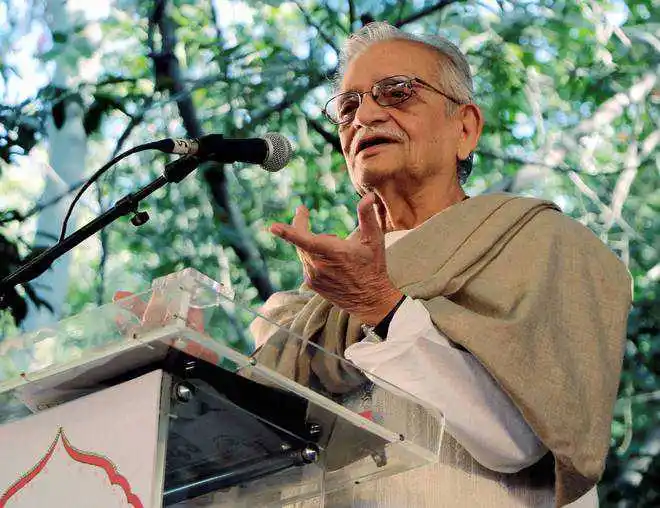
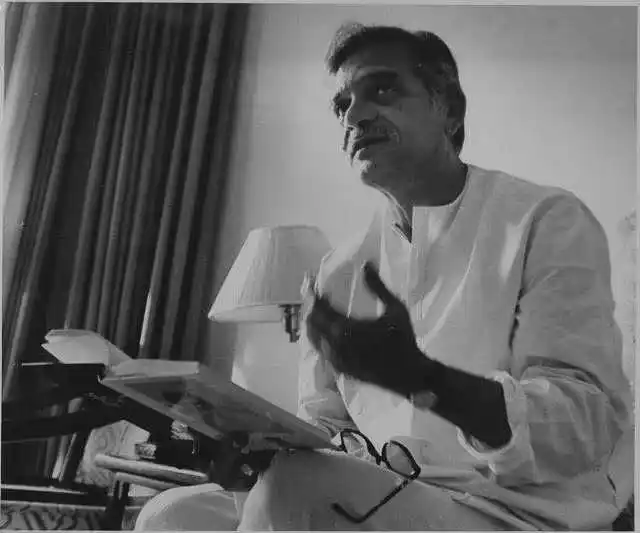 Gulzar, born on August 18, 1934 as Sampooran Singh Kalra, is a well-known Indian Urdu poet, lyricist, author, screenwriter, and film director. He is renowned for his contributions to Hindi film and is regarded as one of the greatest Urdu poets of his generation.
Gulzar, born on August 18, 1934 as Sampooran Singh Kalra, is a well-known Indian Urdu poet, lyricist, author, screenwriter, and film director. He is renowned for his contributions to Hindi film and is regarded as one of the greatest Urdu poets of his generation.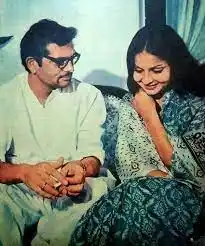 Gulzar and Raakhee's love story began in the early 1970s, when they met. Raakhee's magnetism grabbed Gulzar, and she reciprocated his feelings. The couple decided to take their romance to the next level and married in front of the entire film industry in 1973.Their marriage was attended by prominent figures like Dilip Kumar,
Gulzar and Raakhee's love story began in the early 1970s, when they met. Raakhee's magnetism grabbed Gulzar, and she reciprocated his feelings. The couple decided to take their romance to the next level and married in front of the entire film industry in 1973.Their marriage was attended by prominent figures like Dilip Kumar, 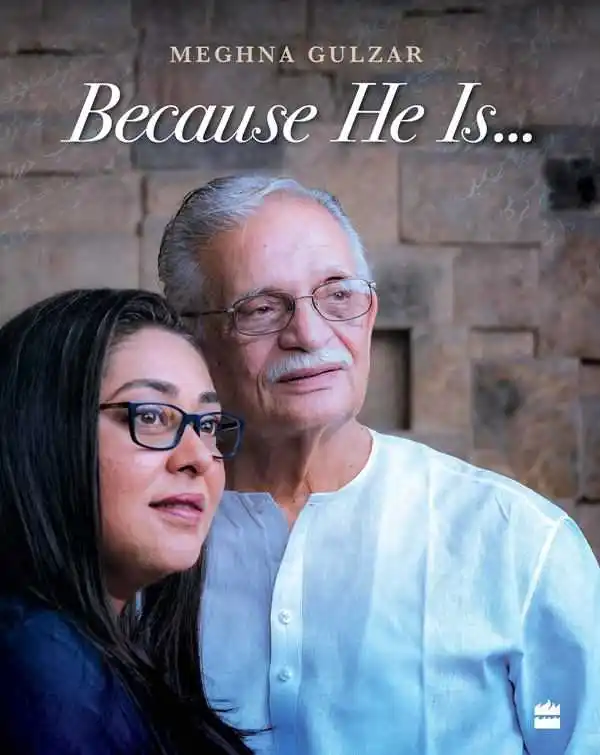 Meghna Gulzar and Gulzar share a deep bond as father and daughter, which is evident in their personal and professional lives. Meghna, an accomplished writer, director, and producer, has drawn inspiration from her father's work and experiences on numerous occasions.
Meghna Gulzar and Gulzar share a deep bond as father and daughter, which is evident in their personal and professional lives. Meghna, an accomplished writer, director, and producer, has drawn inspiration from her father's work and experiences on numerous occasions.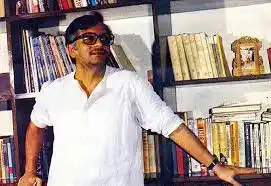 Shailendra and Bimal Roy encouraged Gulzar to join films through his encounters at PWA Sunday gatherings. Gulzar began his career working with filmmakers Bimal Roy and Hrishikesh Mukherjee. In his novel Ravi Paar, he tells the story of Bimal Roy and the agony of creation. He began his career as a songwriter with the music director for the 1963 film Bandini. He discovered an environment related with literature in the group he worked with in films, notably Bimal Roy, whose films were mostly based on literary texts. Shailendra, who wrote the rest of the songs in the film, asked Gulzar to write the song Mora Gora Ang Layle, which was sung by
Shailendra and Bimal Roy encouraged Gulzar to join films through his encounters at PWA Sunday gatherings. Gulzar began his career working with filmmakers Bimal Roy and Hrishikesh Mukherjee. In his novel Ravi Paar, he tells the story of Bimal Roy and the agony of creation. He began his career as a songwriter with the music director for the 1963 film Bandini. He discovered an environment related with literature in the group he worked with in films, notably Bimal Roy, whose films were mostly based on literary texts. Shailendra, who wrote the rest of the songs in the film, asked Gulzar to write the song Mora Gora Ang Layle, which was sung by 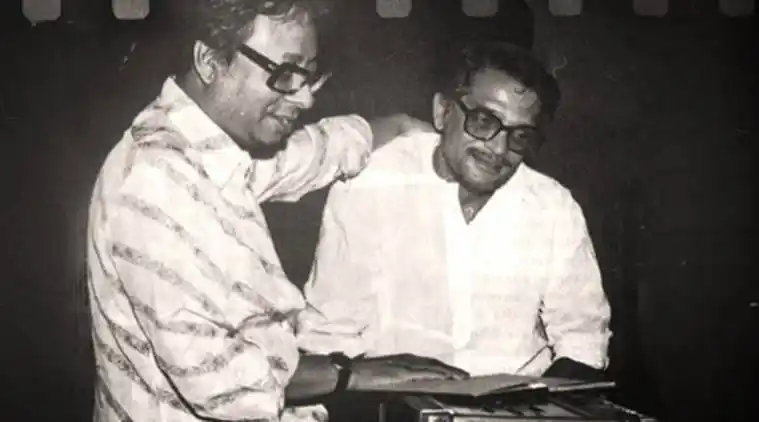 Gulzar directed his first film, Mere Apne (1971), after writing dialogues and screenplays for films like as Aashirwad, Anand, and Khamoshi. The movie was a remake of Tapan Sinha's 1969 Bengali film Apanjan. Meena Kumari portrayed Anandi Devi, an elderly widow caught up in the local clashes between unemployed and troubled youth. The death of Anandi Devi in one of the conflicts helps them see the futility of violence. At the box office, the picture received a Above Average rating. He then gave orders to Parichay and Koshish. Parichay was influenced by the Hollywood film The Sound of Music and was based on Raj Kumar Maitra's Bengali novel Rangeen Uttarain.
Gulzar directed his first film, Mere Apne (1971), after writing dialogues and screenplays for films like as Aashirwad, Anand, and Khamoshi. The movie was a remake of Tapan Sinha's 1969 Bengali film Apanjan. Meena Kumari portrayed Anandi Devi, an elderly widow caught up in the local clashes between unemployed and troubled youth. The death of Anandi Devi in one of the conflicts helps them see the futility of violence. At the box office, the picture received a Above Average rating. He then gave orders to Parichay and Koshish. Parichay was influenced by the Hollywood film The Sound of Music and was based on Raj Kumar Maitra's Bengali novel Rangeen Uttarain.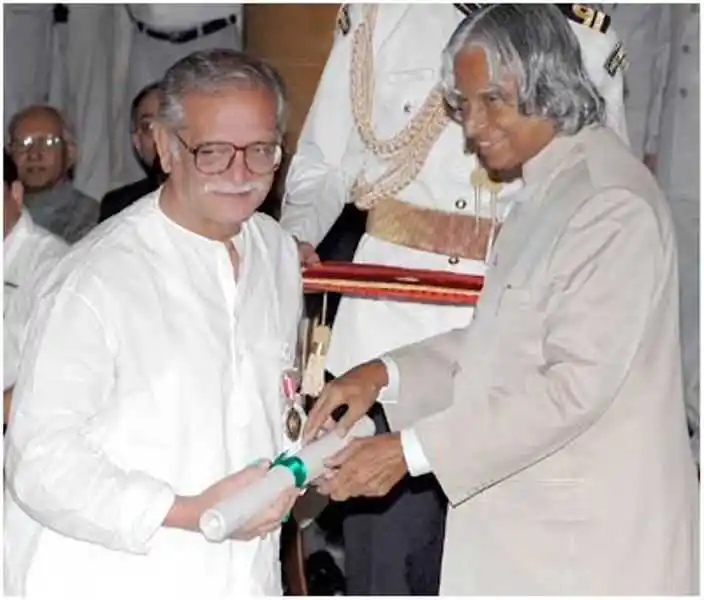 1972-National Film Award-Best Screenplay for Koshish.
1972-National Film Award-Best Screenplay for Koshish.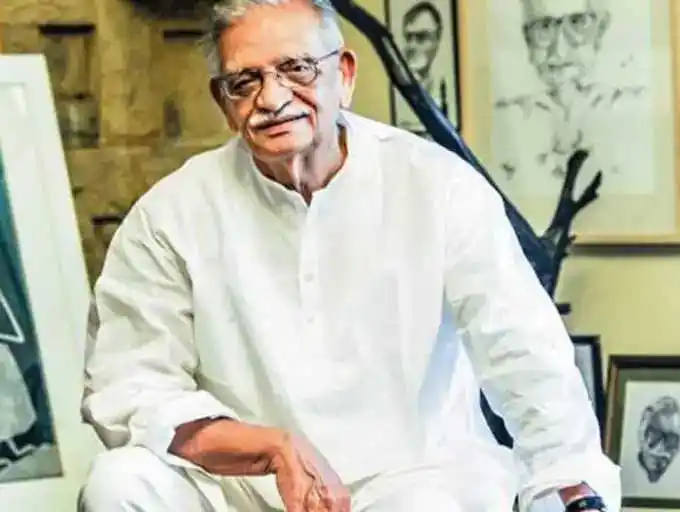 Gulzar’s real name is Sampooran Singh Kalra.
Gulzar’s real name is Sampooran Singh Kalra. We now support international payments
We now support international payments
